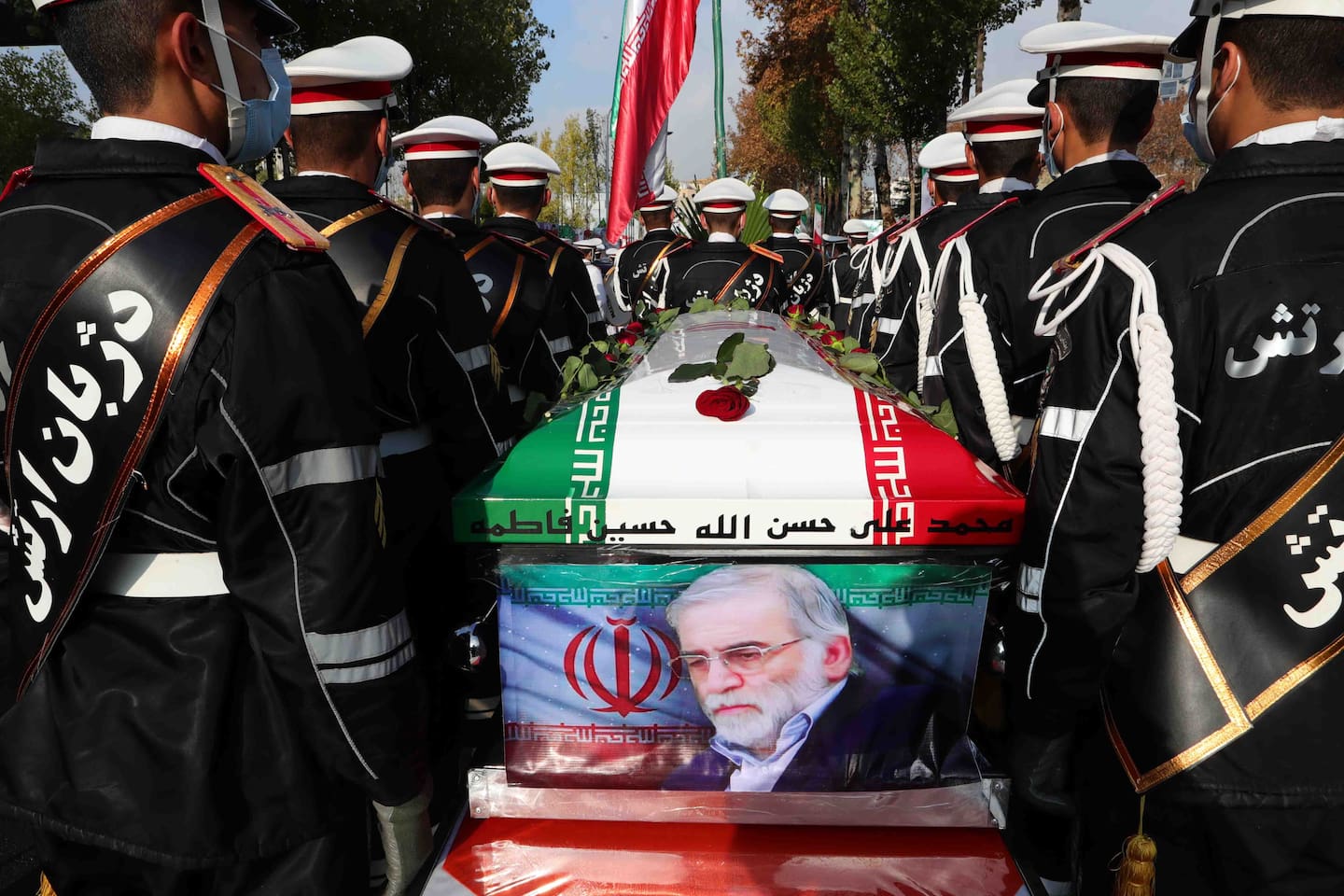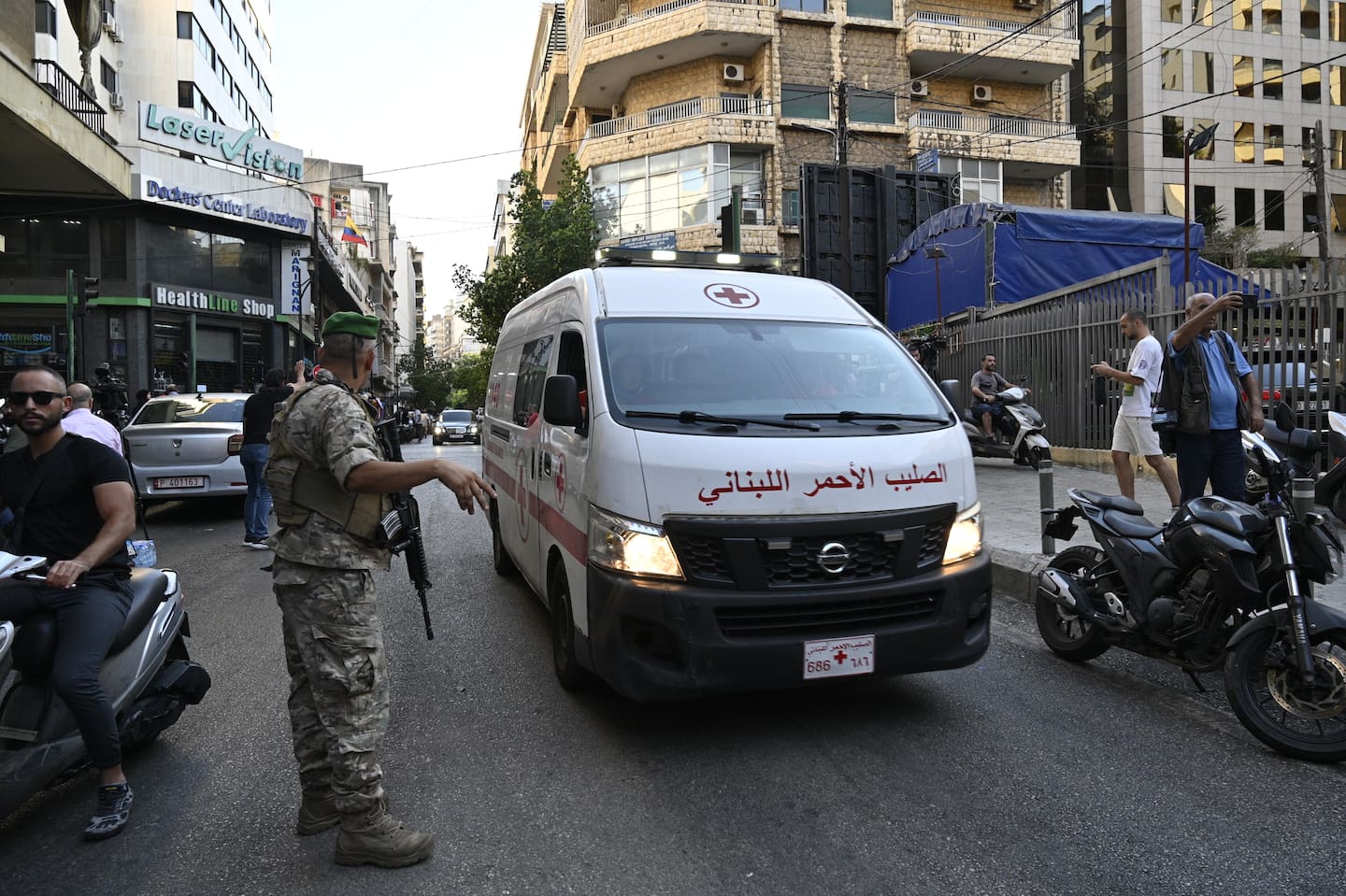Reuters
17 Sep, 2024
Israel has a long history of inventive, unusual assassination methods, and reports that at least nine people may have been killed by exploding pagers could be its latest grim chapter.
As of Tuesday night, Israel had not claimed responsibility for the attack – but it bears many of the hallmarks of its special forces units, such as Mossad.
Formed in 1949, the year after the birth of the state of Israel, Mossad has been linked to many of Israel’s most daring killings.

Mossad was suspected of deploying a remote-controlled machinegun to assassinate Iranian nuclear scientist Mohsen Fakhrizadeh.
Over seven decades, it is thought to have relied on exploding books, remote-controlled machineguns and even poisoned toothpaste to reach its targets, with mixed results.
In 2012, a documentary claimed that a failed 1970s Israeli assassination plot against Saddam Hussein involved a book rigged with explosives.
The documentary, Sealed Lips, recounted how the notoriously paranoid Saddam refused to open the book himself, instead passing it to one of his officials.
As soon as the official opened the book, it exploded, killing the official but failing to injure the Iraqi dictator.
Then there was the mysterious case of the poisoned toothpaste, allegedly deployed to kill Wadie Haddad, the leader of the Popular Front for the Liberation of Palestine.
According to the 2018 book Rise and Kill First: The Secret History of Israel’s Targeted Assassinations, by Ronen Bergman, a New York Times journalist, a deep-cover Mossad hit squad was involved.

An ambulance takes some of the injured to hospital after the explosion of the wireless communication devices, known as pagers, in Beirut, on September 17, 2024.
In 1978, the group gained access to Haddad’s home and swapped his toothpaste for an identical tube containing a toxin developed by Israeli scientists.
The poison was said to have seeped into his mouth through his mucous membranes each time he cleaned his teeth, leading to him being taken to hospital in Iraq.
The Palestinian commander was eventually treated in East Germany, where doctors found the suspicious toothpaste in his toiletries bag.
His death was reportedly slow and painful, with his screams heard from corridors in the hospital, where he died after 10 days.
Mossad was suspected of deploying a remote-controlled machinegun to assassinate Mohsen Fakhrizadeh, the head of Iran’s nuclear programme, in 2020.
The gun was said to have been smuggled into the country piece by piece, assembled and then placed to ambush the scientist as he travelled near Tehran.
Bergman’s book also contains a detailed account of a January 2010 assassination in Dubai, where Mossad agents descended on a hotel to target Mahmoud al-Mabhouh, a Hamas arms supplier.
The hit squad flew into the Emirati city from various European locations on false passports, posing as tennis players. They then killed Mabhouh using a paralysing drug, leaving his body to be discovered by hotel staff.
Bergman himself points out that many other attempted assassinations did not succeed, and were even botched, but they only spread Mossad’s notoriety around the world.
“Occasional blunders have only enhanced the Mossad’s aggressive and merciless reputation,” he writes. “Not a bad thing when the goal of deterrence is as important as the goal of pre-empting specific hostile acts.”
Israel has a long history of pulling off complex attacks like the exploding pagers
Thousands of pagers used members of the militant group Hezbollah exploded near simultaneously in Lebanon and Syria, killing at least nine people and wounding several thousand, officials said
Via AP news wire




Hezbollah and the Lebanese government were quick to blame Israel for the nearly simultaneous detonation of hundreds of pagers used by the militant group's members in an attack Tuesday that killed at least nine people and wounded nearly 3,000 others, according to officials.
Many of those hit were members of militant group Hezbollah, but it wasn't immediately clear if others also carried the pagers. Among those killed were the son of a prominent Hezbollah politician and an 8-year-old girl, according to Lebanon's health minister.
The attack came amid rising tensions between Israel and Iran-backed Hezbollah, which have exchanged fire across the Israel-Lebanon border since the Oct. 7 attack by Hamas that sparked the war in Gaza. Iran’s ambassador to Lebanon was among those injured by the pager explosions.
Israel rarely takes responsibility for such attacks, and its military declined to comment Tuesday. However, the country has a long history of carrying out sophisticated remote operations, ranging from intricate cyberattacks to remote-controlled machine guns targeting leaders in drive-by shootings, suicide drone attacks, and the detonation of explosions in secretive underground Iranian nuclear facilities.
Here is a look at previous operations that have been attributed to Israel:
July 2024
Two major militant leaders in Beirut and Tehran were killed in deadly strikes within hours of each other. Hamas said Israel was behind the assassination of its supreme leader, Ismail Haniyeh, in Iran’s capital. Although Israel didn't acknowledge playing a role in that attack, it did claim responsibility for a deadly strike hours earlier on Fouad Shukur, a top Hezbollah commander in Beirut.
July 2024
Israel targeted Hamas’ shadowy military commander, Mohammed Deif, in a massive strike in the crowded southern Gaza Strip. The strike killed at least 90 people, including children, according to local health officials. The Israeli military said in August that Deif was killed in the attack, though Hamas previously claimed he survived.
April 2024
Two Iranian generals were killed in what Iran said was an Israeli strike on the Iranian consulate in Syria. The deaths led Iran to launch an unprecedented attack on Israel that involved about 300 missiles and drones, most of which were intercepted.
January 2024
An Israeli drone strike in Beirut killed Saleh Arouri, a top Hamas official in exile, as Israeli troops fight the militant group in Gaza.
December 2023
Seyed Razi Mousavi, a longtime adviser of the Iranian paramilitary Revolutionary Guard in Syria, was killed in a drone attack outside of Damascus. Iran blamed Israel.
2021
An underground nuclear facility in central Iran was hit with explosions and a devastating cyberattack that caused rolling blackouts. Iran accused Israel of carrying out the attack as well as several others against Iranian nuclear facilities using explosive drones in the ensuing years.
2020
In one of the most prominent assassinations targeting Iran's nuclear program, a top Iranian military nuclear scientist, Mohsen Fakhrizadeh, was killed by a remote-controlled machine gun while traveling in a car outside Tehran. Iran blamed Israel.
2019
An Israeli airstrike hit the home of Bahaa Abu el-Atta, a senior Islamic Jihad commander in the Gaza Strip, killing him and his wife.
2012
Ahmad Jabari, head of Hamas’ armed wing, was killed when an airstrike targets his car. His death sparked an eight-day war between Hamas and Israel.
2010
The Stuxnet computer virus, discovered in 2010, disrupted and destroyed Iranian nuclear centrifuges. It was widely believed to be a joint U.S.-Israeli creation.
2010
Mahmoud al-Mabhouh, a top Hamas operative, was killed in a Dubai hotel room in an operation attributed to the Mossad spy agency but never acknowledged by Israel. Many of the 26 supposed assassins were caught on camera disguised as tourists.
2008
Imad Mughniyeh, Hezbollah’s military chief, was killed when a bomb planted in his car exploded in Damascus. Mughniyeh was accused of engineering suicide bombings during Lebanon’s civil war and of planning the 1985 hijacking of a TWA airliner in which a U.S. Navy diver was killed. Hezbollah blamed his killing on Israel. His son Jihad Mughniyeh was killed in an Israeli strike in 2015.
2004
Hamas' spiritual leader, Ahmed Yassin, was killed in an Israeli helicopter strike while being pushed in his wheelchair. Yassin, who was paralyzed in a childhood accident, was among the founders of Hamas in 1987. His successor, Abdel Aziz Rantisi, was killed in an Israeli airstrike less than a month later.
2002
Hamas’s second-highest military leader, Salah Shehadeh, was killed by a one-ton bomb dropped on an apartment building in Gaza City.
1997
Mossad agents tried to kill the head of Hamas at the time, Khaled Mashaal, in Amman, Jordan. Two agents entered Jordan using fake Canadian passports and poison Mashaal by placing a device near his ear. They were captured shortly afterward and Jordan’s king threatened to void a still-fresh peace accord if Mashaal died. Israel ultimately dispatched an antidote, and the Israeli agents were returned home. Mashaal remains a senior figure in Hamas.
1996
Yahya Ayyash, nicknamed the “engineer” for his mastery in building bombs for Hamas, was killed by answering a rigged phone in Gaza. His assassination triggered a series of deadly bus bombings in Israel.
1995
Islamic Jihad founder Fathi Shikaki was shot in the head in Malta in an assassination widely believed to have been carried out by Israel.
1988
Palestine Liberation Organization military chief Khalil al-Wazir was killed in Tunisia. Better known as Abu Jihad, he had been PLO chief Yasser Arafat’s deputy. In 2012, military censors allowed an Israeli paper to reveal details of the Israeli raid for the first time.
1973
Israeli commandos shot a number of PLO leaders in their apartments in Beirut, in a nighttime raid led by Ehud Barak, who later became Israel’s top army commander and prime minister. The operation was part of a string of Israeli assassinations of Palestinian leaders that were carried out in retaliation for the killings of 11 Israeli coaches and athletes at the 1972 Munich Olympics.
Thousands of pagers used members of the militant group Hezbollah exploded near simultaneously in Lebanon and Syria, killing at least nine people and wounding several thousand, officials said
Via AP news wire




Hezbollah and the Lebanese government were quick to blame Israel for the nearly simultaneous detonation of hundreds of pagers used by the militant group's members in an attack Tuesday that killed at least nine people and wounded nearly 3,000 others, according to officials.
Many of those hit were members of militant group Hezbollah, but it wasn't immediately clear if others also carried the pagers. Among those killed were the son of a prominent Hezbollah politician and an 8-year-old girl, according to Lebanon's health minister.
The attack came amid rising tensions between Israel and Iran-backed Hezbollah, which have exchanged fire across the Israel-Lebanon border since the Oct. 7 attack by Hamas that sparked the war in Gaza. Iran’s ambassador to Lebanon was among those injured by the pager explosions.
Israel rarely takes responsibility for such attacks, and its military declined to comment Tuesday. However, the country has a long history of carrying out sophisticated remote operations, ranging from intricate cyberattacks to remote-controlled machine guns targeting leaders in drive-by shootings, suicide drone attacks, and the detonation of explosions in secretive underground Iranian nuclear facilities.
Here is a look at previous operations that have been attributed to Israel:
July 2024
Two major militant leaders in Beirut and Tehran were killed in deadly strikes within hours of each other. Hamas said Israel was behind the assassination of its supreme leader, Ismail Haniyeh, in Iran’s capital. Although Israel didn't acknowledge playing a role in that attack, it did claim responsibility for a deadly strike hours earlier on Fouad Shukur, a top Hezbollah commander in Beirut.
July 2024
Israel targeted Hamas’ shadowy military commander, Mohammed Deif, in a massive strike in the crowded southern Gaza Strip. The strike killed at least 90 people, including children, according to local health officials. The Israeli military said in August that Deif was killed in the attack, though Hamas previously claimed he survived.
April 2024
Two Iranian generals were killed in what Iran said was an Israeli strike on the Iranian consulate in Syria. The deaths led Iran to launch an unprecedented attack on Israel that involved about 300 missiles and drones, most of which were intercepted.
January 2024
An Israeli drone strike in Beirut killed Saleh Arouri, a top Hamas official in exile, as Israeli troops fight the militant group in Gaza.
December 2023
Seyed Razi Mousavi, a longtime adviser of the Iranian paramilitary Revolutionary Guard in Syria, was killed in a drone attack outside of Damascus. Iran blamed Israel.
2021
An underground nuclear facility in central Iran was hit with explosions and a devastating cyberattack that caused rolling blackouts. Iran accused Israel of carrying out the attack as well as several others against Iranian nuclear facilities using explosive drones in the ensuing years.
2020
In one of the most prominent assassinations targeting Iran's nuclear program, a top Iranian military nuclear scientist, Mohsen Fakhrizadeh, was killed by a remote-controlled machine gun while traveling in a car outside Tehran. Iran blamed Israel.
2019
An Israeli airstrike hit the home of Bahaa Abu el-Atta, a senior Islamic Jihad commander in the Gaza Strip, killing him and his wife.
2012
Ahmad Jabari, head of Hamas’ armed wing, was killed when an airstrike targets his car. His death sparked an eight-day war between Hamas and Israel.
2010
The Stuxnet computer virus, discovered in 2010, disrupted and destroyed Iranian nuclear centrifuges. It was widely believed to be a joint U.S.-Israeli creation.
2010
Mahmoud al-Mabhouh, a top Hamas operative, was killed in a Dubai hotel room in an operation attributed to the Mossad spy agency but never acknowledged by Israel. Many of the 26 supposed assassins were caught on camera disguised as tourists.
2008
Imad Mughniyeh, Hezbollah’s military chief, was killed when a bomb planted in his car exploded in Damascus. Mughniyeh was accused of engineering suicide bombings during Lebanon’s civil war and of planning the 1985 hijacking of a TWA airliner in which a U.S. Navy diver was killed. Hezbollah blamed his killing on Israel. His son Jihad Mughniyeh was killed in an Israeli strike in 2015.
2004
Hamas' spiritual leader, Ahmed Yassin, was killed in an Israeli helicopter strike while being pushed in his wheelchair. Yassin, who was paralyzed in a childhood accident, was among the founders of Hamas in 1987. His successor, Abdel Aziz Rantisi, was killed in an Israeli airstrike less than a month later.
2002
Hamas’s second-highest military leader, Salah Shehadeh, was killed by a one-ton bomb dropped on an apartment building in Gaza City.
1997
Mossad agents tried to kill the head of Hamas at the time, Khaled Mashaal, in Amman, Jordan. Two agents entered Jordan using fake Canadian passports and poison Mashaal by placing a device near his ear. They were captured shortly afterward and Jordan’s king threatened to void a still-fresh peace accord if Mashaal died. Israel ultimately dispatched an antidote, and the Israeli agents were returned home. Mashaal remains a senior figure in Hamas.
1996
Yahya Ayyash, nicknamed the “engineer” for his mastery in building bombs for Hamas, was killed by answering a rigged phone in Gaza. His assassination triggered a series of deadly bus bombings in Israel.
1995
Islamic Jihad founder Fathi Shikaki was shot in the head in Malta in an assassination widely believed to have been carried out by Israel.
1988
Palestine Liberation Organization military chief Khalil al-Wazir was killed in Tunisia. Better known as Abu Jihad, he had been PLO chief Yasser Arafat’s deputy. In 2012, military censors allowed an Israeli paper to reveal details of the Israeli raid for the first time.
1973
Israeli commandos shot a number of PLO leaders in their apartments in Beirut, in a nighttime raid led by Ehud Barak, who later became Israel’s top army commander and prime minister. The operation was part of a string of Israeli assassinations of Palestinian leaders that were carried out in retaliation for the killings of 11 Israeli coaches and athletes at the 1972 Munich Olympics.
No comments:
Post a Comment